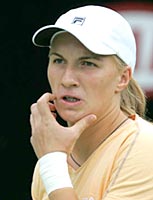Top tennis officials lashed a Belgian government minister who said that U.S. Open champion had failed a doping test, saying the Russian would be allowed to play on in the Australia Open.
 Kuznetsova protested her innocence on Tuesday, saying she had taken cold medicine which she believed was allowed under women's tennis doping rules.
Kuznetsova protested her innocence on Tuesday, saying she had taken cold medicine which she believed was allowed under women's tennis doping rules.
Her compatriot Anastasia Myskina and Argentine seeds Guillermo Coria and Guillermo Canas all scored easy first round victories but Kuznetsova's drug storm overshadowed play on the second day of the centenary Open.
"I pride myself on being a clean athlete of the highest integrity and am offended by these disgraceful accusations," Kuznetsova said in a statement.
"I am sure of my innocence and I will not allow these irresponsible accusations, which do not comply with credible anti-doping procedures, to distract me or my performance at the Australian Open," she said.
WTA Tour chief Larry Scott angrily hit back at Belgian regional sports minister Claude Eerdekens, who said that world number five Kuznetsova had tested positive for ephedrine, a stimulant found in over-the-counter cough medicines.
"I think what he's done is disgraceful. I know our players would like to see an immediate apology for the damage that it's done to our sport already," Scott said.
"It's just shameful what an irresponsible person like this can do to the reputation of a clean sport and three great players," he told a news conference.
CONFIDENT START
The doping storm broke at the weekend when Eerdekens said that a player had tested positive during a four-player charity exhibition in Charleroi last month.
He said Belgian Justine Henin-Hardenne was not the player, throwing the spotlight onto the other three: Kuznetsova and fellow Russian Elena Dementieva and Frenchwoman Nathalie Dechy.
Overnight Eerdekens said Kuznetsova had tested positive for ephedrine, the taking of which is banned "in competition", or during official WTA tournaments.
Exhibition tournaments like the Charleroi event are regarded as out of competition and players can also apply for an exemption to the rules if they are taking cold medicines which may contain ephedrine, Scott said.
"I want to make clear that under the tennis anti-doping programme, ephedrine is not a banned substance when it's out of competition," Scott said.
Kuznetsova made a confident start to the Open on Monday, brushing aside American qualifier Jessica Kirkland 6-1 6-1.
On Tuesday, her Fed Cup team mate Myskina, the third seed, had little trouble in beating Czech Kveta Peschke 6-1 6-4.
Tenth seed Alicia Molik of Australia defeated Anabel Medina Garrigues 6-1 6-3 after the Spaniard saved five match points only to surrender with a double fault.
Confident men's sixth seed Coria brushed aside Czech teenager Tomas Berdych 6-2 6-4 6-0 in the opening match of day two on Rod Laver Arena centre court.
Coria was beaten in the first round in Melbourne last year but put that behind him as he made just 15 unforced errors on the way to victory in 96 minutes.
The ever-improving Canas, who boosted his world ranking last year to 11 from 274 after recovering from a wrist injury, also had little trouble reaching the second round.
The 12th seed beat teenage Australian wildcard Chris Guccione 6-4 6-2 7-6 (7-4).
Frenchman Sebastien Grosjean, the 14th seed, followed the Argentine pair into the second round with a 6-3 6-4 6-3 defeat of compatriot Michael Llodra.










More from rediff